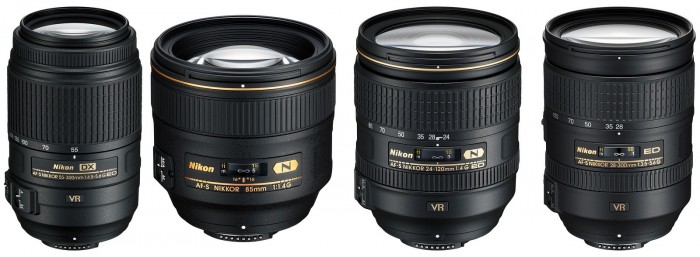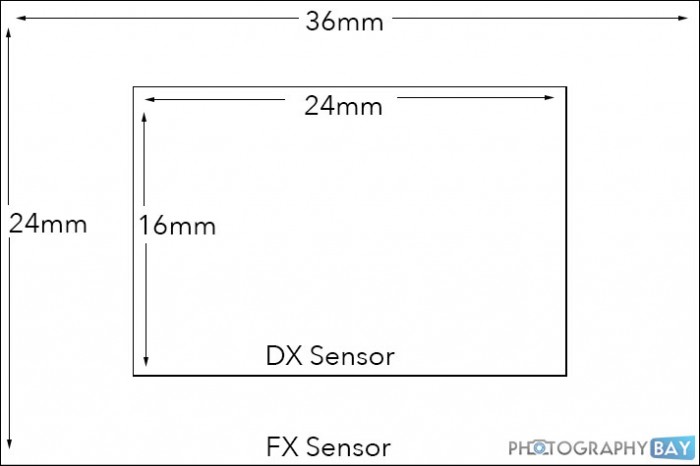
We’ve covered the differences on the Canon side with EF and EF-S lenses. Now, it’s time to look at Nikon and the differences between FX and DX lenses.
Nikon FX and DX lenses refer to the format of image sensors on which the lenses are intended to operate. Nikon makes DSLRs with these two types of sensor formats (FX and DX) – also referred to as full frame and APS-C (or, crop sensor), respectively.
Brief Explanation of Full Frame (FX) and APS-C (DX) Cameras
The full frame sensor is the larger of the two. It is the size of a 35mm film frame – 36mm x 24mm.
The Nikon DX (or, APS-C) sensor is smaller at 24mm x 16mm, which is also slightly larger than Canon’s APS-C format. The field of view (how much of a scene you can see through the viewfinder) is smaller when using the same lens on an APS-C format camera than it would be on a full frame camera.

For example, a Nikon AF-S 50mm f/1.8G FX format lens produces a field of view equivalent to an 75mm lens when used on a Nikon DX (or APS-C) format camera like the Nikon D7100 line. This is often times referred to as a “crop factor”.
So, Nikon DX cameras have a 1.5x crop factor.
Nikon DX cameras include the D300S and lower camera lines. At the time of publication, Nikon DSLRs with four numbers in the model number (e.g., D7100, D5300, D3200) are all DX format cameras. The Nikon D300S is the only current DX format camera with less than four numbers in the model number.
Nikon full frame cameras include the D4S, Df, the D800 line and the D600 line.
FX vs. DX Lenses
Unlike the Canon system Nikon FX and DX lenses can be used interchangeably on either FX or DX cameras. However, the general rule is that DX lenses are design for use with Nikon DX format cameras like the D7100.
On the other hand, FX format lenses are generally acceptable to use on either the Nikon FX or DX format cameras. The times when you might want to consider a DX lens over an FX lens for a DX format camera are when you consider wide angle options. Due to the crop factor discussed above, wide angle DX lenses are generally cheaper than equivalent wide angle FX lenses because of the design.
For example, an 18-55mm f/3.5-5.6G VR II DX format zoom lens runs about $250, while the Nikon 16-35mm f/4G ED VR FX format lens costs around $1250.
Due to the crop factor, the common kit lenses also look different in terms of price and focal lengths for each format. Kit lenses for DX cameras are typically lenses like the 18-55mm and 18-105mm lenses. Typical Nikon FX format “kit” lenses are considered 24-120mm and 24-70mm lenses.
Advanced users may prefer to spend more money on a higher quality FX format lens to use with a DX format camera due to the overall quality of glass in the lens; however, that is a discussion for another day.
DX Crop Mode on FX Format Cameras
As mentioned above, DX lenses can be used on Nikon FX cameras like the D4S and D810. This is possible thanks to Nikon’s smart inclusion of a feature called “DX Crop Mode.”
Essentially, DX Crop Mode avoids the heavy vignetting that we would otherwise experience when using a DX lens on an FX camera by only recording the image using a smaller section in the center of the sensor. Of course, this results in an image with a reduced resolution. However, when you consider the D810 has a 36MP FX sensor, the DX Crop Mode still provides a final image with 15.3MP resolution. Not a bad trade-off at all.
Benefits of DX Lenses
Nikon DX lenses are generally smaller and lighter than Nikon FX lenses because less glass and a smaller lens barrel is required to produce an equivalent field of view for a lens that goes on an DX camera, like the Nikon D5300 and D3200 lines, when compared to a full frame camera. Additionally, as mentioned above, the DX line of lenses are generally more affordable.
Should I Buy FX or DX Lenses?
Hopefully, you are now aware of which Nikon lenses are compatible with your camera. As to which lens you should buy, my suggestion is to buy the one that fits your needs. If you want an extremely wide angle lens for your Nikon D3200 or D7100, then you’ll need to look at the DX line of lenses for something like the Nikon 10-24mm f/3.5-4.5G ED DX lens, which will look like a 15-36mm lens on your camera. You can’t find a non-fisheye lens this wide in Nikon’s FX line up.
If you are worried that you might upgrade someday to a full frame camera, don’t. Quality DX lenses hold their resale value just fine. And, of course, your DX lenses will work on any Nikon FX camera that you buy in the future.
Buy the lens that fits your needs now. If that means you want a massive FX telephoto lens, then go ahead. If you upgrade to a full frame camera later, it will work fine as well.


Apart from weight and costs, is the Image Quality (IQ) of a 50mm DX identical to a 50mm FX?
Generally speaking most 50mm prime lenses are made for FX or full frame cameras, whichever brand. With a Nikon camera, except the 3000 series, 5000 series and a few others like the D-40 will work with the Nikon 50mm f1.8 which is referred to as a nifty 50. Its resolution is superb and on a DX camera it equates to a 75mm f1.8, therefore making it a good portrait lens, or general purpose. Mostly Nikon includes kit lenses of 18 – 55 and 55 – 200 AFS lenses which have a built in focus motor in the lens, so they will work with those cameras mentioned before, whereas the AF 50mm f1.8 lens will work with every other Nikon camera perfectly. I have a couple of D-90s and they have built in focus motors which is what you need to use any straight AF lenses. I was a Nikon film uses and had several Nikon lenses and bought a Nikon D5000 and a brilliant lens 10 – 200 AFS VRII which is Nikon’s amazing vibration reduction system. It’s a beautiful lens. I also bough a Nikon 70 – 300 FX IF VRII and that gives me a reach of 105 – 450 in DX. Great for wildlife!!
Great article but I am still a bit confused. I have a DX camera (Nikon D3300) and an 18-55 DX lens Kit lens). Given the article, is its effective Focal length 27-82.5?
I was told the 1.5 crop factor was only used when putting FX lenses on DX cameras not when using DX lenses on DX cameras. can you clarify for me?
The crop factor effect applies to both DX and FX lenses. So, you are correct that the 18-55mm lens behaves like a 27-82.5mm lens would on a full frame camera.
We often see compact cameras with an “equivalent” focal length zoom range – like “24-100mm equivalent” when the actual lens optics are 6-25mm. But camera and lens manufacturers don’t do that in the current lines of crop sensor cameras. As a result, you still need to take the crop factor lenses into account for DX lenses.
I want to up grade to FX or prime hd cameras and lenses. But the cost is too high here in Nigeria due to exchange rates. And I don’t what to do
So, if I am understanding correctly, my N60 35mm camera with Tamrons 28-80mm and 75-300mm lenses are full frame(fx) format? I want to upgrade to a digital camera. Will these lenses work on a new DSLR camera? Any suggestions? Family photos, vacations, and kids sports pics.
I have an old Nikon D40 camera. I’ve been looking for an 80-400mm telephoto lens but I’m not sure if the two are compatible and if this lens is fully functional on my D40. Can you help?
don’t buy, this lense works better on FX cameras only
I have a Nikon D7100, which will best lens for portrait photography.
35mm f 1.8Gll
I know this is kind of an old article. But I’m just getting into some photography. I am currently looking at a Nikon kit available at Costco, here:
https://www.costco.com/Nikon-D7500-DSLR-Camera-2-Lens-Bundle.product.100365110.html
What is your take on this set? I know that the lenses that come with it are not going to be the best. Probably very cheap.
I want to take fast sports pictures of our kids who play Soccer and Football. Do you think this kit will do the job? Or should I upgrade to the big brother D500 and look for a more expensive lens? Most of the time games start off with sun and then the sun sets and it’s only stadium lights we have. Just so you have an idea of the setting.
Many Thanks for any advise / input or recommendations you may have.
Go with the D7500. You’ll need a better telephoto lens eventually but that kit is a good starter kit.
The problem is the lower light levels. Try your 70-300mm but understand that the f/6.3 aperture is not bright enough for great action shots in low light. Eventually, look for 70-200mm f/2.8 options from Nikon, Sigma and Tamron depending on your budget.
Understand why your gear isn’t delivering the shot you want before you upgrade to more expensive gear though.
I bought Nikon D5200 kit 2 years back which included Nikon Af-S 18-55mm 3.5-5.6G II (DX) & Nikon Af-S 55-200mm 4-5.6G II ED (DX)
I also have a Af-S 50mm 1.8G lens
Now I am planning to upgrade to a full frame camera which I decided to be Nikon D750
I wanted to know if these lenses will work with my new full frame camera? I’m very much confused because I only have budget for the camera and not for new lenses.
Please help
Thanks in advance
The 50mm f/1.8G lens is FX format, so it will provide a full FX image size at 50mm. The other lenses are DX lenses. You can use them in DX mode on the D750 just fine (1.5x crop). They’ll work basically like they do on your D5200. The image resolution will be 10.7MP, I believe.
Thanks a lot Sir for clearing my confusion.
Also for this article, very helpful.
yes all will work with D750
is a full frame camera megapixel higher than that of a crop frame?
yes 1.6 time larger…
I got two questions
1. Is it okay to buy a 50 mm prime with f1.8 G with Fx format for my cameras (I got an old D3100 and an D5300 which is of Dx format)
my future plan is to buy a D750 with fx….
2. also I have two lenses an 18-55 and an Tamron 70-300 which I am planning to use with my future D750 with fx format….both my lenses are of Dx format…..Please advice….
buy 35mm f1.8G for dx format dslr… this will do work as 50mm prime lense due to its aps c crop sensor..
Hi I realise you’ve probably been asked this millions of times so I’m sorry to ask again,
I have a D3300 with 18-55mm G VR AF-P DX lens and I’m looking to upgrade to a full frame
Nikon like the D750.Will this lens be suitable for this camera to make use of the full frame sensor,
or will I need to buy FX lenses?
Thanks.
I bought a Nikon camera D 7100 three years ago with a Nikon lens DX 18-105 mm. I would like to buy a telephoto lens for my holiday in July to shoot wildlife – maybe a 70-300 or 105- 200 mm.
I do not necessarily need to buy a Nikon lens and I am not a professional photographer and I just take photos on my holidays.
What lens would you suggest please which is reasonably priced ?
Can I also use this same lens for my daughter’s camera which is a Nikon D 3300.
You write: ‘If you are worried that you might upgrade someday to a full frame camera, don’t. ‘
I assume you meant to write something on the lines of if you’re worried, don’t be, rather than telling us not to upgrade…
Sorry, I’m a linguist.
I know this is an old article…but hoping you can help….I’m a teenager getting into photography. I was handed a used Nikon D7100.
Here’s my question….with the focal length….
Do I get the same range if I use a Nikon DX 70-300mm(Nikon AF-P DX NIKKOR 70-300mm f/4.5-6.3G ED VR) and a Nikon FX 70-300mm (Nikon 70-300mm f/4.5-5.6G ED IF AF-S VR ).
In other words do I see the same image/horizon on both images at 70mm and 300mm with both the DX and FX lense on my DX body?
You really missed the boat on this one guys, but maybe you don’t think anyone really cares. And in attempting to differentiate between FX and DX, you completely overlooked the D500!
Lenses are the key To optical interpretation and heavily influence clarity. The same focal length lens by one company can be junk compared to another’s only because of the grade of glass used in the optical elements. There are another whole litany of differences, but the “crop factor” ends up being one of the lesser characteristics for the “purist”
The staff, experts and professionals employed by the camera manufacturers make mistakes because of the money and the logic of the company. They don’t listen to users who earn billions. Boss manufacturers need to listen to visual artists and users of specialized photographers. Because no strategy will tell honestly the lack of market, without thinking of cheating, without thinking of personal interest, for example:
Nikon does not have a DX small built single focus lens. There’s a lot of demand, actually. I’m talking about prime lenses between 20 and 25 mm. The landscape lens is more suited to the dx logic production strategy, but there are only zoomers. Why not ?!
Dx lenses are more cost-effective but do not look at apertures such as 1.8, 1.4, are made of glass at 1.4, so if Zeiss produces a high quality wide-angle prime lens for the dx, it wipes out the more expensive counterparts on the market. If the dx lens is slightly larger and of zeiss quality, very solid ratio, clear images will be produced.
They need to do their best with the sensor, of course, 30% of what the lens detects is wasted. They need to expand their sensor research and spread it all over the world, giving them prizes. Personally, the mirrorless or crop machine is just an investment for me because of its small size, the more favorable price is the nice part. The big machine seems useless and stupid. Just to make money. I never use a full-scale, large-scale machine, including a photo, 99% of the users don’t use it like me. dx need to upgrade the quality thoroughly, as soon as the d7500 has passed over some tiny flaws in the sensor and lens, this is over, the market for mirrorless and crop sensors, the most important customers of companies, that is, they should pay more attention.
They need to do new research, both in the machine case and in the sensor technology.